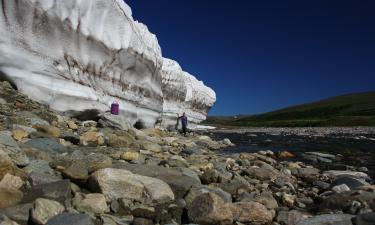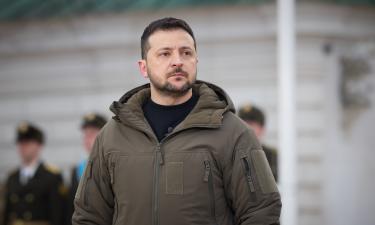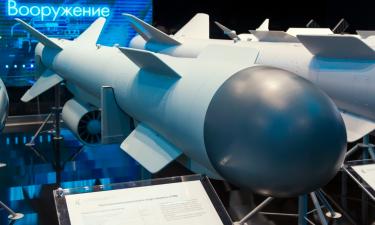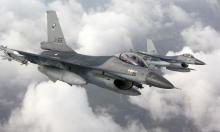The War May Entail Ecological Disaster in the World
Americans and the allies are going to proceed with the usage of ammunition with depleted uranium as danger of such ammunition for the health of soldiers hasn’t been confirmed. German biologist Thomas Henningsen tells about his experience during the visit to Kuwait after the first Gulf War together with Germany’s Greenpeace expedition.
“The sky was the first thing we saw. It was a terrible sight! When we were approaching Kuwait in a plane, we saw everything was black around the place. The sky was black in broad daylight. The war ended half a year ago, but the oil wells were still burning. Such was our first experience upon arrival to the region.”
Black Rain All Year Long
When Iraqi troops abandoned Kuwait in 1991, they carried out Saddam’s order to set about 700 oil wells on fire. And what ecologists saw on that place surpassed the worst expectations. The smog concentration in the air exceeded all possible norms 30 times. About three barrels of oil burnt out in the burning wells every day, which made up approximately 5% of the daily world consumption of oil. Black clouds went up to the height of up to 3 kilometers and were spread far beyond the borders of Kuwait. It was within a whole year that black rains containing the poisonous mixture of sulfur dioxide, nitric oxide, nitric acid and hydrocarbon fell not only in Kuwait and Iraq, but also in Saudi Arabia and Iran. Even in Kashmir that is 2.000 kilometers from Kuwait, people saw black snow.
Million tons of oil will leak into the sea and the desert
Another Greenpeace member Andreas Bernstoff says that ejection of carbon dioxide within the first week of fires approximately reached the annual ejection from the British Islands. “Oil was partially burnt down, but partially not. One million ton of oil leaked into the sea and in the desert. There were oil lakes in the desert, the beaches and the sea were contaminated. As the temperatures were too high as a result of the burning, the soil in the area got crusted over, and the surface resembled asphalt. This certainly caused serious injures to the desert flora and fauna. Fish, crabs and shellfish choked under millions of tons of oil on the sea surface.”
Just to compare: when the Prestige tanker went down at the Spanish shore, up to this day only about 50 thousand tons of heavy oil have leaked from board of the tanker into the sea. And this accident entailed an ecological disaster of an enormous scale; journalists called beaches in Galicia the Death Coast.
Struggle against “Iraqi blighters of the nature”
Fifth Fleet public affairs officer, Lieutenant Josh Frey says that special troops are concentrated along the Persian Gulf coast to avert another ecological disaster in the region. They protect the oil wells and oil refineries from “Iraqi terrorist blighters of the nature.” 90 American and British vessels are guarding oil tankers. US Secretary of Defense Donald Rumsfeld officially declared that arson of oil wells would inflict punishment adequate to perpetration of a war crime. Guilty Iraqi officers cannot hope for indulgence. The Defense Ministry of Kuwait declared the northern part of the country on the Iraqi borders (the area where oil fields are situated) a closed zone. Special permits are necessary to enter the zone.
Depleted uranium poses additional danger
Several experts say that weapons containing depleted uranium are very dangerous for the health of soldiers and local population, and also for the environment. Bunker buster bombs are stuffed with depleted uranium; these bombs were used in Afghanistan. Biochemist from Berlin, Professor Albrecht Schott explains that because of the high density of the element, weapons stuffed with depleted uranium can break through several meters of stone or even through tank armoring.
Professor Schott examined 19 British veterans of the first Persian Gulf War for genetic materials. Analysis of this kind is complicate, laborious and expensive. And despite this fact, Albrech Schott says he thinks it’s his duty to investigate a so-called “Balkan syndrome”. This name was given to frequent instances of cancer, leucaemia in particular, among veterans of the wars in Bosnia, Kosovo and the first war in Iraq when weapons stuffed with depleted uranium were used.
British and American ministries of defense have held thorough researches on the problem, and now they say that there is no connection between usage of depleted uranium and the so-called “Balkan syndrome”. For this very reason financing to investigation of Albrech Schott was denied. Then the scientist decided to carry out the research at his own responsibility and with his private finance.
The professor says: “I examined the veterans and discovered considerable defects in the chromosomal structures of all of the 19 men. 67% of children of veterans of the first Persian Gulf war, those who were born after the war, have serious congenial defects. The number of people suffered from usage of weapons with depleted uranium amounts to thousand of people, including the population of Iraq, southern Iraq especially, of Kuwait and Saudi Arabia. Radioactive aerosol emerging after an explosion is spread over many kilometers.”
Yelena Granovskaya Deutsche Welle
Translated by Maria Gousseva
Read the original in Russian: https://www.pravda.ru/world/33806-ecology/
Related links:
Subscribe to Pravda.Ru Telegram channel, Facebook, RSS!





